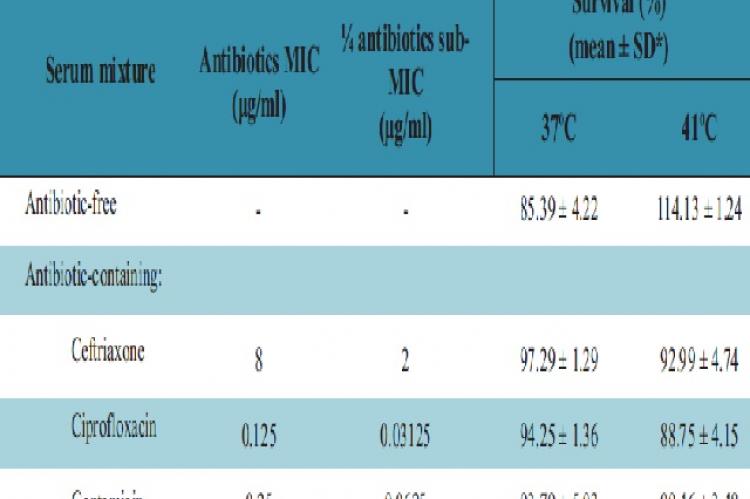The ability of antibiotics to interact with host defenses provide justification for in vitro evaluation of the interaction of antibiotics, bacteria, and host defenses to help identify those factors that influence therapy for bacterial infections. This study evaluates the effect of sub-inhibitory concentrations (sub-MICs) of ceftriaxone, ciprofloxacin and gentamicin on killing of Escherichia coli ATCC 25922 by human serum. Saline-washed 18-h Mueller-Hinton broth culture of test strain was inoculated into 50% human serum-Hanks’Balanced Salt Solution mixture and serum mixture containing ¼ minimum inhibitory concentrations of ceftriaxone, ciprofloxacin or gentamicin and incubated at 37ºC or 41ºC. Counts at T = 0 h and T = 2 h of incubation by spread plate method and survival (%) at these temperatures were then determined under each of the conditions. Results are means of three determinations. At 37oC, serum susceptibility was inhibited significantly (P<0.05) by sub-MICs of ceftriaxone (P=0.01) and ciprofloxacin (P=0.03) but insignificantly (P>0.05) by sub-MIC of gentamicin (P=0.09). At 41oC however, serum susceptibility was enhanced significantly (P<0.05, P=0.00) by sub-MICs of the antimicrobial agents tested. In the presence of all the antibiotics tested, serum susceptibility was insignificantly (P>0.05) influenced at both 37oC (P=0.38) and 41oC (P=0.49). Sub-MICs of some antimicrobial agents can enhance susceptibility of Escherichia coli to human serum at elevated temperature (41oC) usually encountered in fever and the common practice of reducing fever in many diseases before antibiotics treatment is commenced may be unnecessary
View:
- PDF (380.88 KB)


